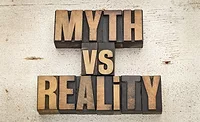Sales & Restoration: Challenging the Most Common Selling "Fact"
Calling all ambiverts!

Over the years, many misconceptions about "selling" have emerged across all industries, not just the restoration realm, simply because they sounded right. Sadly, these facts have remained unchallenged for so long that countless careers have faltered and scores of companies have lost market share and revenue.
Let’s talk a look at of the most common selling ‘fact’ and why it is completely false.
Extraverts Make Great Sales Reps, Right?
Everyone knows outgoing people make the best sales representatives. It’s only logical.
Extraverts are assertive, friendly, gregarious types who enjoy socializing and interacting—perfect for rubbing elbows and meeting potential clients.
We’ve all heard the phrase natural salesperson. And when we hear that term we think of those quick with a joke and able to talk about anything, anytime, anywhere. Extraverts aren’t shy and they aren’t hesitant about taking action. It only makes sense that they are the rock stars in the selling arena.
If that ‘fact’ were correct, finding high performers would be simple.
Research Proves Otherwise
Too often, no distinction is made between common knowledge and fact. Common knowledge says extraverts make amazing salespeople. Fact says otherwise.
Research in Journal of Applied Psychology and Journal of Individual Differences analyzed nearly 4,000 salespeople in 35 separate studies and concluded there is no correlation between extraversion and sales results. That’s correct—no correlation.
If these studies are true (and they are), the logical knee-jerk reaction would be to assume that introverts must be the selling personality of choice. If one extreme didn’t make a difference then the opposite must. Again, it would only be logical. Again, such beliefs would be wrong.
Ambiverts—the Stealth Sales Personality
Surprisingly, a newly-recognized form of personality is proven to be the king of sales performance: the ambivert.
An ambivert is a hybrid—neither extremely extraverted nor overly introverted. Visualize a scale between 1-10 with 1 being completely introverted and 10 being completed extraverted. An ambivert is slightly to the introverted side of middle. They’re a little more introverted than not, but display positive traits of both extremes.
In the studies referenced, ambiverts consistently produced over 30% more sales than either extraverts or introverts (both of which generated almost identical results)—proving common knowledge isn’t very reliable.
Extraverts Don’t Win the Selling Game
Why do ambiverts perform so much better than either extraverts or introverts? Let’s examine what the two personality extremes offer in the real world.
Extraverts aren’t comfortable with silence or sitting back, waiting for things to happen. They’re movers and shakers, highly talkative, and usually poor listeners. Those who are extraverted tend towards narcissism, ignoring both the needs and perspectives of others. They want to be the center of attention, usually have well-defined ideas of how things should be, and want action to occur on their timetable. Does that sound like someone you’d want selling for you?
On the other end of the scale, introverts are drained by socializing. They’re usually reluctant to strike up conversations and are more focused on individual activities. Not exactly qualities you’d want from someone charged with meeting strangers and asking for business.
The Sweet Spot of Personalities
Ambiverts are hidden diamonds among salespeople, but are overlooked by far too many owners and hiring managers.
This group doesn’t make everyone laugh all the time, they don’t instantly light up the room when they enter, and they don’t always leave a smile on faces when exiting. What they do exceptionally well, however, is engage tactically through effective listening.
Ambiverts are patient without being reticent, calm without being passive. They inherently understand the prospect is star of the show. This group also uses biology to their advantage, instinctively remembering they have two ears and one mouth. Listening twice as often as talking, ambiverts pick up on things extraverts typically talk past, and they push for clarity and commitment where introverts tend to remain silent.
Locating Ambiverts
So, how do you find these unicorns? Testing. There are numerous free online personality tests geared specifically to determining the core of candidates. Such tests should be the first stage in any modern interview process. Don’t trust your gut—it’s likely well-entrenched in common knowledge.
Forget false facts and focus on science when seeking your next restoration sales superstar. The person who doesn’t bowl you over, but also doesn’t allow you to bowl them over, may be exactly who you’re seeking.
Looking for a reprint of this article?
From high-res PDFs to custom plaques, order your copy today!





